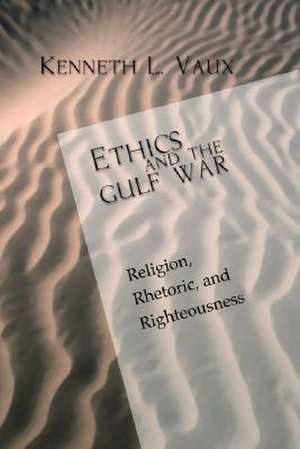Ethics and the Gulf War
Autor Kenneth L. Vauxen Limba Engleză Paperback
| Toate formatele și edițiile | Preț | Express |
|---|---|---|
| Paperback (2) | 145.81 lei 3-5 săpt. | |
| Wipf and Stock Publishers – | 145.81 lei 3-5 săpt. | |
| Taylor & Francis – 7 dec 2020 | 382.27 lei 6-8 săpt. | |
| Hardback (1) | 764.20 lei 6-8 săpt. | |
| Taylor & Francis – 7 iun 2019 | 764.20 lei 6-8 săpt. |
Preț: 145.81 lei
Nou
Puncte Express: 219
Preț estimativ în valută:
27.90€ • 29.84$ • 23.26£
27.90€ • 29.84$ • 23.26£
Carte disponibilă
Livrare economică 27 martie-10 aprilie
Preluare comenzi: 021 569.72.76
Specificații
ISBN-13: 9781592441464
ISBN-10: 1592441467
Pagini: 200
Dimensiuni: 155 x 221 x 11 mm
Greutate: 0.29 kg
Editura: Wipf and Stock Publishers
ISBN-10: 1592441467
Pagini: 200
Dimensiuni: 155 x 221 x 11 mm
Greutate: 0.29 kg
Editura: Wipf and Stock Publishers
Notă biografică
Kenneth L. Vaux received his D.Th. from the University of Hamburg in 1968. He is professor of Theological Ethics at Garrett-Evangelical Theological Seminary, Evanston, IL.
Cuprins
Preface -- An Introduction to Just War Ethics -- War Chronicle: The Ethics of the War over Kuwait -- War Ethics in Israel: Biblical and Modern Perspectives -- Islam, Jihad, and Iraq's Holy War -- Christian Traditions of Pacifism and Just War -- Secular Just War Theory -- Justice, Peace, and the Future of War -- Afterword
Descriere
Descriere de la o altă ediție sau format:
The war on the ground and in the air over Kuwait and Iraq was not the only Gulf War being fought in early 1990. George Bush and Saddam Hussein were also battling for public opinion and for the perception of legitimacy for their actions. In this effort, both men as well as their spokespersons appealed to the just war theory of their religious traditions. In this perceptive and wide-ranging book, Kenneth Vaux elucidates the great just war traditions of Judaism, Christianity, and Islam, evaluating the key events of the war in light of the religious rhetoric used by both sides. From the first stirrings of conflict to its uncertain aftermath, religious and ethical traditions played a major role in winning support not just for the U.S. and Iraqi peoples but of public opinion worldwide. Throughout Vaux demonstrates the wide gaps between religious rhetoric and the political-military action it has been called on to support. Ethics and the Gulf War is not a typical ethical treatise; Vaux understands ethical reflection to encompass history, philosophy, psychology, ecology, theology, and eschatology. His book is a valuable contribution to the understanding of the Gulf War, and it is fascinating for scholars and laypersons coming to this subject from almost any area of interest.
The war on the ground and in the air over Kuwait and Iraq was not the only Gulf War being fought in early 1990. George Bush and Saddam Hussein were also battling for public opinion and for the perception of legitimacy for their actions. In this effort, both men as well as their spokespersons appealed to the just war theory of their religious traditions. In this perceptive and wide-ranging book, Kenneth Vaux elucidates the great just war traditions of Judaism, Christianity, and Islam, evaluating the key events of the war in light of the religious rhetoric used by both sides. From the first stirrings of conflict to its uncertain aftermath, religious and ethical traditions played a major role in winning support not just for the U.S. and Iraqi peoples but of public opinion worldwide. Throughout Vaux demonstrates the wide gaps between religious rhetoric and the political-military action it has been called on to support. Ethics and the Gulf War is not a typical ethical treatise; Vaux understands ethical reflection to encompass history, philosophy, psychology, ecology, theology, and eschatology. His book is a valuable contribution to the understanding of the Gulf War, and it is fascinating for scholars and laypersons coming to this subject from almost any area of interest.
